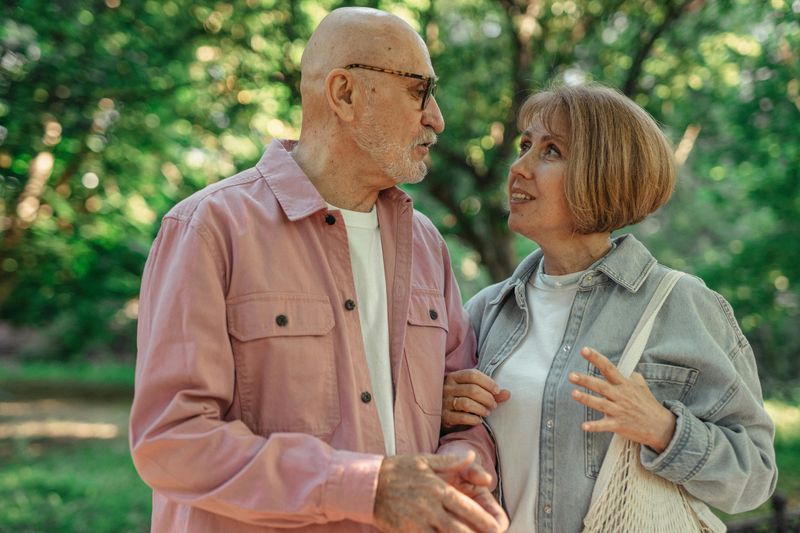Have you ever wondered what makes some relationships thrive while others struggle? The secret often lies in respect and equality between partners. When two people truly value each other as equals, their connection becomes stronger and more fulfilling. These partnerships don’t just happen by accident – they’re built through daily choices, open communication, and mutual care.
1. Cheering Each Other On
Partners in respectful relationships become each other’s biggest fans. They celebrate victories together, whether it’s a promotion at work or finally mastering a challenging recipe. More importantly, they provide encouragement during tough times.
This mutual support extends beyond just words. They make sacrifices when needed, adjust schedules to attend important events, and offer practical help with goals and dreams. They don’t compete or feel threatened by each other’s success.
When one person grows, the whole relationship benefits. This creates a positive cycle where both partners feel safe to pursue their ambitions, knowing they have a solid foundation of support at home.
2. Decisions Made Together
“What do you think about this?” becomes a common phrase in equal partnerships. Big decisions like moving, changing jobs, or making major purchases involve thoughtful conversations where both voices matter equally.
No one pulls rank or makes unilateral choices that affect both people. Instead, they listen carefully to each other’s concerns, preferences, and ideas. When disagreements arise, they work toward compromises that honor both perspectives.
This shared approach builds trust and prevents resentment. Even when one person has more expertise in a particular area, they still involve their partner in the process, recognizing that decisions in a partnership belong to both people.
3. Communication Without Fear
Words flow easily in relationships grounded in respect. Partners speak honestly about their feelings, needs, and concerns without walking on eggshells. They create safe spaces for difficult conversations, approaching topics with curiosity rather than judgment.
“I statements” replace blame, and active listening becomes second nature. When one person speaks, the other truly hears them instead of just waiting for their turn to talk. They check for understanding by repeating back what they heard.
Even during disagreements, the focus stays on resolving issues rather than winning arguments. This healthy communication style allows both partners to feel valued and understood, creating deeper intimacy and preventing small issues from becoming major problems.
4. Freedom to Be Vulnerable
Tears, fears, and insecurities find safe harbor in respectful relationships. Both partners know they can share their deepest worries without facing ridicule or dismissal. This emotional safety becomes the bedrock of true intimacy.
When one person opens up about something difficult, their partner responds with empathy rather than trying to fix, minimize, or one-up their experience. They validate each other’s emotions without judgment, understanding that feelings don’t need to be rational to be real.
This creates a powerful cycle of trust. The more emotionally safe partners feel with each other, the more authentic they become, which in turn strengthens their bond and creates space for growth both individually and as a couple.
5. Balanced Responsibilities
The mental load gets shared in equal partnerships. No single person shoulders all the planning, organizing, and remembering for the household. Instead, responsibilities are distributed based on skills, preferences, and availability rather than gender or outdated expectations.
Regular check-ins help ensure neither partner feels overwhelmed. When circumstances change – like a new job or health challenge – they readjust the balance together. They express gratitude for each other’s contributions, never taking them for granted.
This fair division prevents burnout and resentment. Both partners feel like teammates rather than manager and employee, creating a household that runs smoothly because everyone contributes meaningfully to maintaining their shared life.
6. Personal Space Honored
“I need some alone time” gets met with understanding, not offense, in respectful relationships. Partners recognize that maintaining individuality strengthens rather than threatens their bond. They respect each other’s physical and emotional boundaries without taking them personally.
This looks different for every couple. For some, it means separate hobbies or friend groups. For others, it’s about having private physical spaces or designated quiet hours. The common thread is that both people feel comfortable expressing their needs for space.
By honoring these boundaries, partners demonstrate profound respect for each other as complete individuals. They understand that coming together by choice rather than obligation or dependency creates a healthier, more sustainable connection between two whole people.
7. Disagreements Without Destruction
Arguments happen even in the healthiest relationships. The difference lies in how couples handle them. In respectful partnerships, conflicts become opportunities for understanding rather than battlegrounds for dominance.
Name-calling, eye-rolling, and bringing up past mistakes are off-limits. Instead, partners focus on the specific issue at hand, using conflicts to learn more about each other’s perspectives. They take breaks when emotions run high and return to discussions when they can speak calmly.
Most importantly, they repair after disagreements. Sincere apologies, changed behaviors, and renewed affection help heal any wounds from the conflict. This approach transforms potential relationship damage into moments of growth and deeper connection.
8. Room to Grow Individually
“Who are you becoming?” sparks exciting conversations in equal partnerships. Both people actively support each other’s personal development, whether it’s pursuing education, exploring spirituality, or developing new skills. They celebrate how these individual journeys enrich their shared life.
This support goes beyond verbal encouragement. They create practical conditions that allow for growth, like adjusting schedules or budgets to accommodate classes or training. They show genuine interest in what their partner is learning.
Unlike controlling relationships where one person feels threatened by change, respectful partners understand that personal growth strengthens the relationship. They view their partnership as a garden where two distinct plants flourish side by side, each growing toward the light in their own way.
9. Balance of Influence
Power dynamics remain fluid in healthy relationships. Neither person consistently dominates conversations, decisions, or activities. Instead, leadership shifts naturally based on the situation, expertise, and energy levels.
This balance shows up in small ways: taking turns choosing restaurants or movies, alternating who drives on road trips, or sharing control of the remote. In bigger matters, it means respecting each other’s veto power on important issues and ensuring both partners have equal access to financial resources.
The hallmark of this equality is comfort in disagreeing. Both people feel free to express different opinions without fear of punishment or withdrawal of affection. This creates a relationship where power is shared rather than wielded over one another.
10. Recognition and Gratitude
“Thank you for…” becomes a daily refrain in respectful relationships. Partners notice and acknowledge both big gestures and small kindnesses. They express specific appreciation rather than vague gratitude, naming exactly what they value about each other.
This recognition extends beyond practical contributions. They acknowledge each other’s character strengths, emotional support, and the unique perspective each brings to the relationship. They speak positively about their partner to others, never diminishing them publicly.
Most importantly, they show appreciation consistently, not just when trying to make up after conflicts or when wanting something. This creates an atmosphere of genuine recognition where both people feel seen, valued, and appreciated for exactly who they are.










